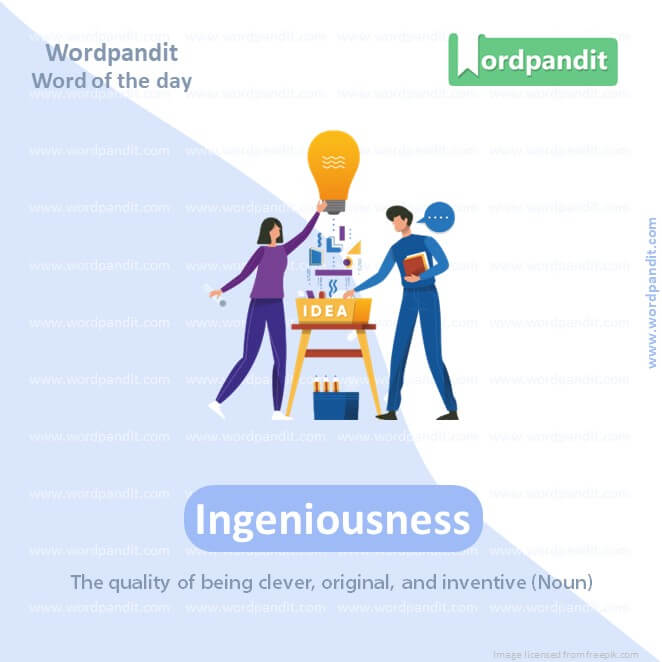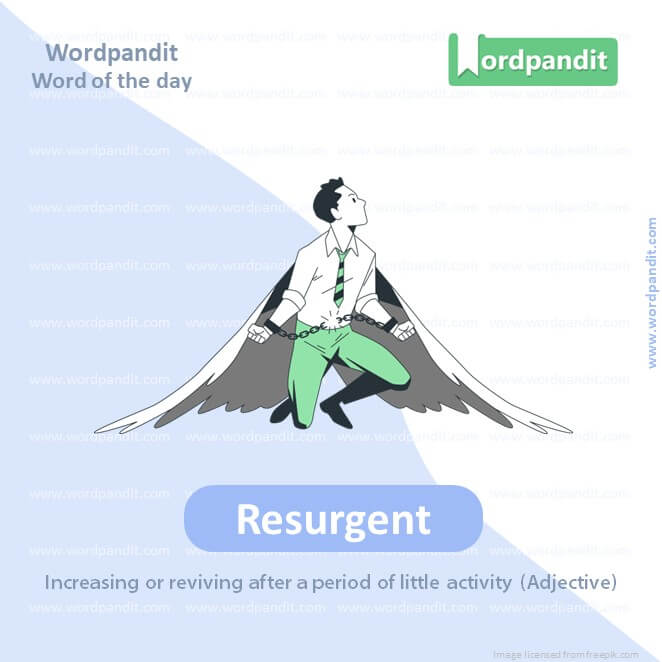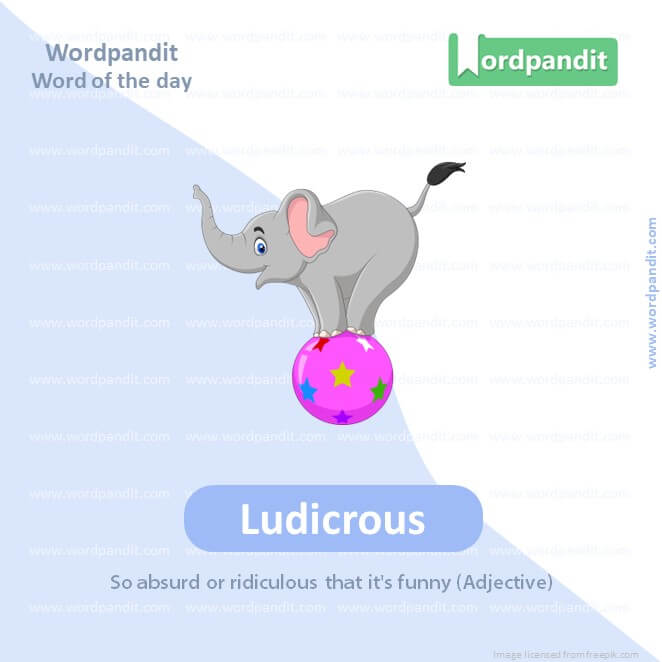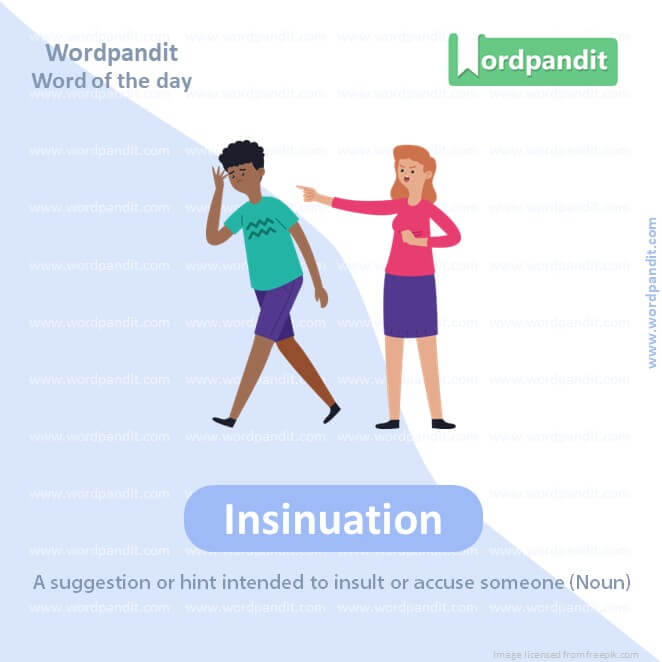Daily Vocabulary Words: List of Daily Used Words in Leading Indian Newspapers
Hi there. Welcome to this special section @ Wordpandit. Our endeavour here is straightforward: highlighting daily vocabulary words that you would come across in leading newspapers in the country. We have included the following newspapers in our selection:
• The Times of India
• The Economic Times
• Hindustan Times
• Mint
• Indian Express
We are putting in extensive work to develop your vocabulary. All you have to do is be regular with this section and check out this post daily. This is your repository of commonly used words; essentially, we are posting a list of daily used words. Hence, this has significant practical application as it teaches you words that are commonly used in leading publications mentioned above.
Visit the website daily to learn words from leading Indian newspapers.
WORD-1: Exquisite
CONTEXT: We Indians must not forget that French and American bombs destroyed many exquisite Hindu temples built by Champa kings between the 4th and 14th centuries in central Vietnam.
SOURCE: Indian express
EXPLANATORY PARAGRAPH: Exquisite is like something that is really beautiful and perfect. It’s like seeing the most colorful and pretty butterfly.
MEANING: Extremely beautiful and delicate (Adjective)
PRONUNCIATION: eks-kwi-zit
SYNONYMS: Beautiful, Elegant, Delicate, Lovely, Refined, Superb
USAGE EXAMPLES:
1. The wedding dress was absolutely exquisite.
2. He admired the exquisite design of the vase.
3. The chef prepared an exquisite meal.
4. Her performance was exquisite and captivated the audience.

WORD-2: Ingeniousness
CONTEXT: To see the incredible bravery and ingeniousness of Vietnamese guerillas, come to Cu Chi Tunnels in a forest on the city’s outskirts.
SOURCE: Indian express
EXPLANATORY PARAGRAPH: Ingeniousness is like being really smart and creative in solving problems or making things. It’s like building a cool castle out of blocks in a new way.
MEANING: The quality of being clever, original, and inventive (Noun)
PRONUNCIATION: in-jeen-yus-ness
SYNONYMS: Creativity, Inventiveness, Cleverness, Originality, Brilliance, Ingenuity
USAGE EXAMPLES:
1. His ingeniousness was evident in his unique inventions.
2. The ingeniousness of the plan surprised everyone.
3. She showed great ingeniousness in solving the puzzle.
4. The design of the gadget reflected pure ingeniousness.
WORD-3: Miraculously
CONTEXT: Vietnam is a miraculously transformed nation. With the realisation of its two major goals — independence (from colonial rule) and unity (reunification of the northern and southern parts of the country)
SOURCE: Indian express
EXPLANATORY PARAGRAPH: Miraculously is like when something amazing happens that you didn’t expect, like a magic surprise. It’s like if you thought a flower was gone, but then it grows back really fast.
MEANING: In a way that is surprising and seems impossible (Adverb)
PRONUNCIATION: mi-rak-yuh-lus-lee
SYNONYMS: Amazingly, Astonishingly, Wonderfully, Remarkably, Extraordinarily, Unbelievably
USAGE EXAMPLES:
1. She miraculously recovered from her illness.
2. The team miraculously won the game in the last second.
3. He miraculously found his lost toy under the bed.
4. The flowers bloomed miraculously overnight.

WORD-4: Resurgent
CONTEXT: They politely said that India does not pay enough attention to expanding trade and business relations with a resurgent Vietnam.
SOURCE: Indian express
EXPLANATORY PARAGRAPH: Resurgent is like something that was gone or quiet but has come back strong. It’s like a superhero who returns to save the day after a long time.
MEANING: Increasing or reviving after a period of little activity (Adjective)
PRONUNCIATION: re-sur-jent
SYNONYMS: Revived, Renewed, Rejuvenated, Revitalized, Reinvigorated, Reestablished
USAGE EXAMPLES:
1. The resurgent team made a comeback in the championship.
2. Interest in the artist’s work was resurgent.
3. The resurgent economy showed signs of improvement.
4. After years of decline, the movement was resurgent.

WORD-5: Caricature
CONTEXT: The only thing missing was a blackboard with a cheeky caricature of the Vice President and Rajya Sabha chairman, Jagdeep Dhankhar.
SOURCE: Indian express
EXPLANATORY PARAGRAPH: Caricature is like a funny drawing of someone where some parts of them are made to look really big or silly. It’s like a cartoon version of a person.
MEANING: A drawing that exaggerates a person’s features to create a humorous or mocking effect (Noun); To create such a drawing (Verb)
PRONUNCIATION: kar-i-kuh-choor
SYNONYMS: Cartoon, Parody, Mockery, Lampoon, Sketch, Exaggeration
USAGE EXAMPLES:
1. The artist drew a caricature of the celebrity.
2. His speech was a caricature of the politician’s mannerisms.
3. They enjoyed seeing caricatures of themselves at the fair.
4. The book contained a caricature of the city’s culture.
WORD-6: Exempting
CONTEXT: Their shrill insistence on exempting these offices from satire rings hollow, given their own treatment of our former vice-president, Hamid Ansari.
SOURCE: Indian express
EXPLANATORY PARAGRAPH: Exempting is like being allowed to not follow a rule or do something that everyone else has to do. It’s like if everyone has to go to bed early, but you don’t because you’re exempt.
MEANING: Freeing someone from an obligation or rule (Verb)
PRONUNCIATION: ig-zempt-ing
SYNONYMS: Excusing, Sparring, Waiving, Excluding, Relieving, Dispensing
USAGE EXAMPLES:
1. The law exempts certain charities from taxes.
2. He was exempting her from the assignment due to illness.
3. Many students were exempted from the final exam.
4. The policy is about exempting small businesses from certain regulations.

WORD-7: Ludicrous
CONTEXT: that mimicry is a form of flattery and art, and that he did not intend to hurt Dhankhar’s feelings” — as rather ludicrous.
SOURCE: Indian express
EXPLANATORY PARAGRAPH: Ludicrous is like something so silly or funny that it’s hard to believe. It’s like seeing a dog wearing a big hat and sunglasses.
MEANING: So absurd or ridiculous that it’s funny (Adjective)
PRONUNCIATION: loo-di-kruhs
SYNONYMS: Absurd, Ridiculous, Preposterous, Laughable, Outrageous, Silly
USAGE EXAMPLES:
1. The idea of flying cars seemed ludicrous to many.
2. He made a ludicrous attempt to explain his lateness.
3. The ludicrous movie had everyone laughing.
4. Her excuse was so ludicrous that no one believed it.

WORD-8: Insinuation
CONTEXT: What I do disagree with this editorial is the insinuation that somehow, because of this act of mimicry, the Opposition has lost the moral high ground to question the BJP. If anyone is at fault here, it is the media.
SOURCE: Indian express
EXPLANATORY PARAGRAPH: Insinuation is like giving a hint or suggesting something without saying it directly. It’s like hinting that you want a cookie without actually asking for it.
MEANING: A suggestion or hint intended to insult or accuse someone (Noun)
PRONUNCIATION: in-sin-yoo-ay-shun
SYNONYMS: Implication, Hint, Innuendo, Suggestion, Allusion, Intimation
USAGE EXAMPLES:
1. His insinuation about her work ethic was unfair.
2. The insinuation in his voice was unmistakable.
3. She resented the insinuation that she was not qualified.
4. The article was full of insinuations about the celebrity’s private life.
WORD-9: Disillusioned
CONTEXT: If disillusioned youth are breaking into Parliament to protest rising unemployment, perhaps the media should be asking what the government is planning to do to combat the issue.
SOURCE: Indian express
EXPLANATORY PARAGRAPH: Disillusioned is like feeling disappointed because something wasn’t as good as you thought it would be. It’s like expecting a huge cake for your birthday but getting a small one instead.
MEANING: Disappointed because something is not as good as one believed it to be (Adjective)
PRONUNCIATION: dis-i-loo-zhuhnd
SYNONYMS: Disenchanted, Disappointed, Let down, Disheartened, Dissatisfied, Cynical
USAGE EXAMPLES:
1. She became disillusioned with her job.
2. After the scandal, many voters were disillusioned.
3. His experiences had left him disillusioned about politics.
4. The disillusioned fans left the game early.
WORD-10 Dirigiste
CONTEXT: Make in India (MII) does not, by any stretch, bring back dirigiste recollections of the license raj, self-sufficiency, import-substituting industrialisation, and the like.
SOURCE: Indian express
EXPLANATORY PARAGRAPH: Dirigiste is like when the government makes a lot of decisions about businesses and how things are done in the country. It’s like having a teacher who decides what everyone does in class.
MEANING: Relating to an economic system where the government controls and directs the economy (Adjective)
PRONUNCIATION: di-ree-zheest
SYNONYMS: Authoritarian, Controlled, Regulatory, State-directed, Centralized, Government-led
USAGE EXAMPLES:
1. The dirigiste policies shaped the country’s economy.
2. He criticized the dirigiste approach of the government.
3. The dirigiste system was in contrast to free-market practices.
4. In a dirigiste economy, the state plays a key role in decision-making.
Vocabulary Sentence
The task of mastering language stretches beyond the realm of solitary words. It invites us to construct and comprehend a ‘vocabulary sentence’. This amalgamation of words into meaningful sentences adds layers to our linguistic prowess. However, effectively learning from a ‘vocabulary sentence’ requires some strategic insight. So, how should we approach it?
Firstly, when encountering a ‘vocabulary sentence’, it’s pivotal to comprehend the word in context. Deciphering its place and role in the sentence gives a deeper insight into the word’s meaning, usage, and nuances. This approach aids in firm retention and active application of words.
Another technique to master a ‘vocabulary sentence’ is to break it into manageable chunks. Look at each word, understand its function, and then put it all together to comprehend the sentence as a whole. This step-by-step dissection and understanding better cements the ‘vocabulary sentence’ into your learning.
Mimicking the prosody and rhythm of language while practicing ‘vocabulary sentence’ can also foster better learning. In this regard, listening to podcasts or watching videos in the target language can be exceptionally beneficial. They showcase real-life demonstrations of how words are strung together into sentences with correct stress patterns and intonations.
Lastly, crafting your own ‘vocabulary sentence’ with learnt words strengthens understanding and boosts recall. Be it during conversation or writing, actively using these sentences plays a key role in contextual learning.
In essence, unfolding a ‘vocabulary sentence’ is a treasure trove of learning opportunities. With proper understanding, breaking sentences into chunks, mimicking prosody, and actively crafting sentences, the journey of learning from a ‘vocabulary sentence’ becomes engaging and fruitful. Every sentence learnt and applied is a valuable catch in the linguistic sea!













